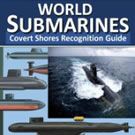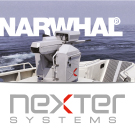| |
|||
| a | |||
Naval
Forces News - USA |
|||
U.S.
Navy MQ-4C Triton UAS Conducts First Flight with MFAS Search Radar |
|||
The
U.S. Navy's latest
MQ-4C Triton UAS equipped with a new search radar completed
its inaugural flight April 18 over Patuxent River air space. The radar,
known as the Multi-Function Active Sensor (MFAS), is expected to greatly
enhance maritime domain awareness by providing the MQ-4C with a 360
degree view of a large geographic area while providing all-weather coverage
to expedite detecting, classifying, tracking and identifying points
of interest. |
|||
 Link to MQ-4C Triton datasheet The MQ-4C Triton unmanned aircraft takes off from Naval Air Station Patuxent River, Md. April 16 to conduct its first flight from the naval base. The aircraft began sensor testing on April 18 and flew with its new maritime search radar. (U.S. Navy photo) |
|||
“This
first sensor flight is a huge achievement for the program,” said
Sean Burke, Triton program manager. “Our Navy and Northrop Grumman
team has worked extremely hard on this developmental effort, completing
more than 40 surrogate flights over the last three years, and we saw
the realization of that development work.” During this initial test event, MFAS exercised its primary operating mode, known as Maritime Surface Surveillance (MSS). The MSS mode provides continuous watch over a broad area. "Our primary objective was to test this new radar, but we also looked at how the aircraft performed as well as testing additional data links," said LCDR Glenn Rioux, government flight test director and senior Air Test and Evaluation Squadron (VX) 20 representative supporting the Triton integrated test team. "This was a successful flight on many levels. We are still reviewing the data and actively planning our next text event." Along with the MFAS radar, the MQ-4C will also carry an Electro-Optical/Infrared (EO/IR) sensor that will provide still imagery and full-motion video of potential threats; an electronic support measures package to identify and geolocate radar threat signals; and an Automatic Identification System (AIS) that will detect and track vessels equipped with AIS responders. When operational, the MQ-4C Triton UAS will provide 24/7 ISR coverage virtually anywhere in the world. Its ability to dwell at high altitudes will improve intelligence collection and bring an unprecedented level of maritime domain awareness to the warfighter operating and sustaining up to five orbits across the globe. Link to MQ-4C Triton datasheet |
Video released by NAVAIR |
|||










